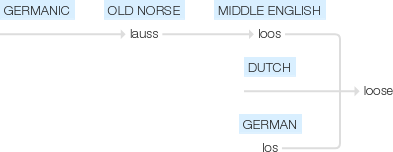Loose
Middle English loos ‘free from bonds’, from Old Norse lauss, of Germanic origin; related to Dutch and German los .
wiktionary
From Middle English loos, los, lous, from Old Norse lauss, from Proto-Germanic *lausaz, whence also -less, leasing; from Proto-Indo-European *lewH-, *lū-(“to untie, set free, separate”), whence also lyo-, -lysis, via Ancient Greek.
loose
etymonline
loose (adj.)
early 13c., lous, loos, lowse, "not securely fixed;" c. 1300, "unbound, not confined," from Old Norse lauss "loose, free, unencumbered; vacant; dissolute," cognate with Old English leas "devoid of, false, feigned, incorrect" (source of -less) from Proto-Germanic *lausaz (source also of Danish løs "loose, untied," Swedish lös "loose, movable, detached," Middle Dutch, German los "loose, free," Gothic laus "empty, vain"), from PIE root *leu- "to loosen, divide, cut apart."
Meaning "not clinging, slack" (of clothes, etc.) is from mid-15c. Meaning "not bundled" is from late 15c. Sense of "unchaste, immoral" ("lax in conduct, free from moral restraint") is recorded from late 15c. Meaning "at liberty, free from obligation" is 1550s. Sense of "rambling, disconnected" is from 1680s. As an adverb, "loosely," from 1590s. A loose end was an extremity of string, etc., left hanging; hence something unfinished, undecided, unguarded (1540s); to be at loose ends is from 1807. Phrase on the loose "free, unrestrained" is from 1749 (upon the loose). Colloquial hang loose is from 1968.
loose (v.)
c. 1200, lousen, "to set free, turn loose," also "undo, untie, unfasten," from loose (adj.). Of arrows from c. 1400. Related: Loosed; loosing.
